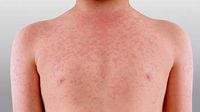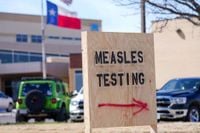A Pueblo resident who recently traveled to Mexico is now Colorado's first confirmed case of measles since 2023, public health officials said Monday. This individual, who was unvaccinated, visited an area experiencing an ongoing measles outbreak, according to the Colorado Department of Public Health and Environment (CDPHE).
State officials have alerted individuals who frequented the Southwest Deli and Cafe in South Pueblo between March 17 and 21, as well as those who visited the Southern Colorado Clinic in Pueblo West on March 22 from 3:30 to 6 p.m., that they may have been exposed to the virus. Anyone potentially exposed is advised to monitor for symptoms for 21 days and to consider avoiding public gatherings.
Measles is highly contagious and can cause severe complications, including pneumonia and encephalitis. Symptoms typically include high fever, cough, runny nose, watery eyes, and a characteristic rash. The Centers for Disease Control and Prevention (CDC) emphasizes that measles can spread from one person to nine out of ten people who are close to them, making vaccination critical.
In a broader context, measles cases in the United States are on track to surpass the 2024 numbers. As of now, there are 483 confirmed measles cases in 2025, a significant increase from the 285 cases recorded for the entire previous year. Alarmingly, a child in Texas died from measles in February, marking the first pediatric death from the virus since 2003. The last adult death from measles occurred in 2015.
Dr. Rachel Herlihy, the state epidemiologist, urged Coloradans to review their vaccination status, stating, "The MMR vaccine provides excellent protection and helps prevent outbreaks like the one we are seeing globally." She also noted that the vaccine can prevent infection if administered within 72 hours of exposure.
Meanwhile, the outbreak has not been confined to Colorado. In Texas, the Department of State Health Services reported a staggering 400 cases as of March 28, 2025, with 41 patients hospitalized and one child confirmed dead. Notably, only two of the Texas cases involved vaccinated individuals, while the rest were unvaccinated or had an unknown vaccination status.
Texas has become the epicenter of this measles outbreak, with most cases concentrated in Gaines County, which has recorded 270 infections. Other counties, including Terry, Lubbock, Yoakum, Dawson, and Lamar, have also reported double-digit case numbers. The outbreak has been linked to a community with low vaccination rates, particularly among Mennonites, where only about 82 percent of children are vaccinated against measles.
In New Mexico, Lea County has reported 42 of the state's 44 confirmed measles cases, with its proximity to Texas contributing to the spread. Kansas has also reported 23 confirmed cases, with recent infections linked to the ongoing outbreaks in Texas and New Mexico.
As public health officials grapple with rising cases, pediatric infectious disease experts are advocating for an early dose of the measles, mumps, and rubella (MMR) vaccine for infants aged 6 to 11 months who live in or travel to areas with ongoing outbreaks. Former CDC director Rochelle Walensky and colleagues emphasized the need for updated vaccination guidelines, highlighting that infants are particularly vulnerable due to waning maternal antibodies.
Dr. Tina Tan, a pediatric infectious disease physician, stated, "If infants are going to travel to Lubbock, Texas, or an area where they can be exposed, they definitely should get a dose of MMR vaccine at least 2 weeks before traveling." This recommendation comes as vaccination rates across the country have slipped, raising concerns about the potential for further outbreaks.
In North Carolina, where no measles cases have been recorded this year, officials are taking proactive measures to prevent an outbreak. State Epidemiologist Zack Moore noted that while vaccination coverage remains relatively high, it is declining, which could increase the risk of vaccine-preventable diseases. The state has seen a rise in whooping cough cases, with numbers 3.6 times higher than last year.
Moore expressed concern about the implications of the Texas outbreak, stating, "We’ve already surpassed the 2024 national measles counts. If measles were to enter North Carolina, it would require a massive response, including immediate isolation and testing protocols."
Health officials in North Carolina are working closely with local health departments to prepare for potential cases. This includes educating healthcare providers about recognizing symptoms and how to respond effectively. With measles being an airborne illness that can linger in the air and on surfaces for up to two hours, the need for swift action is critical.
As the situation evolves, public health experts continue to stress the importance of vaccination. The MMR vaccine has been shown to be highly effective, with a 97% efficacy rate after two doses. However, vaccine hesitancy remains a significant challenge, fueled by misinformation and distrust in science.
Dr. Amy Winter, an infectious disease modeler, highlighted the contagious nature of measles, noting that one case can lead to 12 to 18 secondary cases in a susceptible population. The historical context of measles is sobering; before the vaccine was introduced, the virus caused approximately 48,000 hospitalizations and resulted in 400 to 500 deaths annually in the U.S.
As measles resurges in the U.S. and across the globe, public health officials are calling for renewed efforts to ensure vaccination rates rise and that communities take proactive steps to protect vulnerable populations. The ongoing outbreaks serve as a stark reminder of the importance of vaccination in preventing severe illness and protecting public health.








